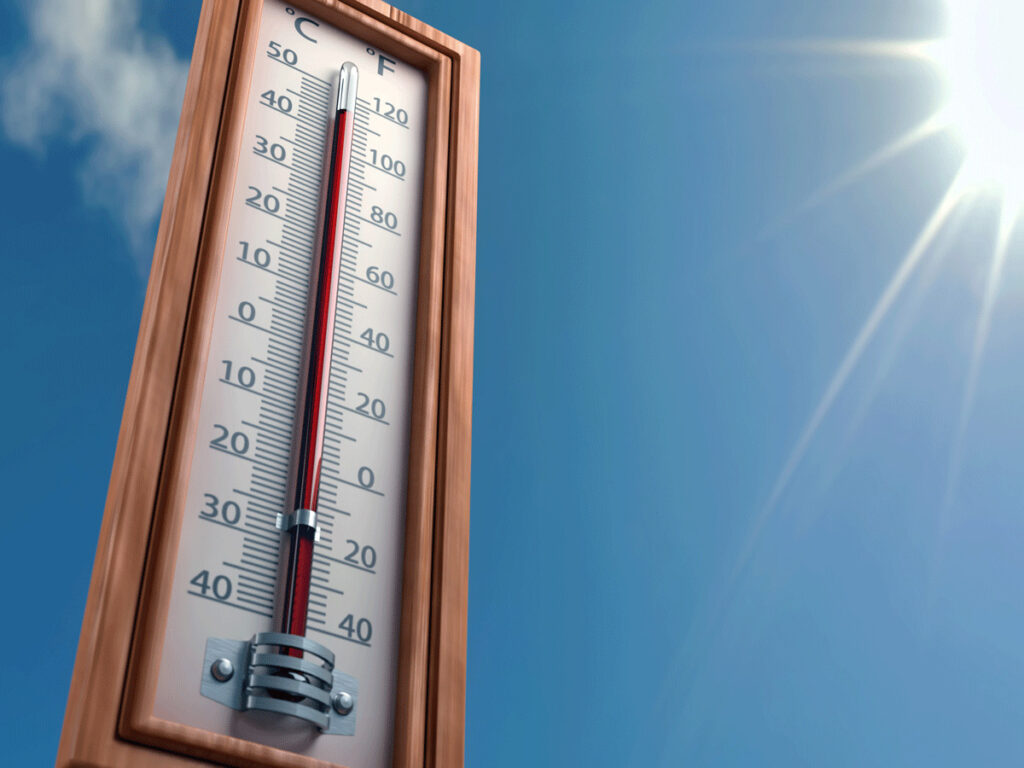Have you ever wondered how HOT it can get outside before your A/C starts to falter? Today, we at Air Repair Pros are going to explore just that!
At What Temperature Does an AC Stop Working?
Residential air conditioners are designed to perform optimally up to an outside temperature of 95 degrees Fahrenheit. When the mercury rises past that 95-degree mark, your AC’s performance and efficiency will start to decline. While most AC units can still function in higher heat, they begin to struggle, with a maximum operational temperature usually around 120 degrees. Beyond this, the unit’s ability to cool effectively diminishes, and it may even stop working altogether.
How Cool Should My House Be if It’s 100 Degrees Outside?
A good rule of thumb is that a properly functioning air conditioner should be able to cool your home up to 30 degrees cooler than the outside temperature. So, if it’s 100 degrees outside, your AC should be able to maintain an indoor temperature of around 70 degrees. However, this depends on several factors, including the size of your AC unit, the humidity levels, the insulation in your home, and the overall square footage.
Highest Cooling Temperature
The highest cooling temperature your AC can handle depends on a lot of factors like size of your AC unit, humidity, insulation, square footage of the house, etc. A good ballpark figure however is that most properly sized AC units can cool your house up to 30 degrees cooler than the weather outside.
But let’s go back to what happens when you hit 120 degrees outside.
What happens when 120 degrees is reached?
To understand this, let’s delve into the cooling process. The AC system cools your home by using a refrigerant—a special substance that absorbs and releases heat. This refrigerant starts as a gas, absorbs heat from inside your home, and is then compressed by the outdoor unit, which tries to cool it down enough to convert it back into a liquid. This transformation is critical to keep the cool air flowing.
The thing is, each refrigerant has a “critical temperature”—a limit beyond which it just won’t convert back into a liquid, no matter how much it’s compressed. This is like trying to freeze water in a hot oven. It’s simply not going to happen.
The refrigerant currently used in new A/C systems, R410A, has a critical temperature of 162 degrees Fahrenheit. However, it’s crucial to remember that the outdoor unit of your A/C, known as the condenser, can’t chill the refrigerant down to the exact temperature of the outside air. Usually, it gets the refrigerant to a temperature around 20 degrees above the outside air temperature. So, if the outside temperature is 120 degrees, your A/C is aiming to get the refrigerant to around 140 degrees—a little under the critical limit.
However, there’s more to it. Just because the refrigerant could theoretically handle these high temperatures doesn’t necessarily mean the rest of your system can. The ability of your A/C to effectively cool your home at these extreme temperatures also depends on factors like the capacity of the system and how well the compressor can manage the increased heat and pressure.
How Can You Cool Your Home Down When the Temperature Is Too High?
- Regular Maintenance: Regular AC maintenance is crucial to ensure that your system performs efficiently, even on the hottest days. This includes cleaning or replacing air filters, checking refrigerant levels, and inspecting the system for any issues.
- Use Ceiling Fans: Ceiling fans can help circulate cool air throughout your home, making it feel cooler. Make sure your fans are set to rotate counterclockwise in the summer to push cool air down.
- Close Blinds and Curtains: Keeping blinds and curtains closed during the hottest parts of the day can block out heat from the sun, reducing the temperature inside your home.
- Seal Leaks: Ensure your home is well-insulated and seal any leaks around windows and doors to prevent cool air from escaping and hot air from entering.
- Use a Dehumidifier: High humidity can make your home feel warmer than it is. Using a dehumidifier can help reduce the moisture in the air, making your home feel cooler.
- Avoid Using Heat-Generating Appliances: Try to avoid using appliances that generate heat, such as ovens and stoves, during the hottest parts of the day. Opt for microwave cooking or outdoor grilling instead.
- Install Programmable Thermostats: Programmable thermostats can help manage your cooling schedule efficiently, ensuring your AC works only when needed, thus saving energy and maintaining comfort.
- Stay Hydrated and Dress Appropriately: Drink plenty of water and wear light, breathable clothing to stay cool.
Conclusion
Your AC unit is an essential ally in fighting off the Texas heat, but it has its limits. Regular maintenance and smart home practices can help ensure that your system performs efficiently, even on the hottest days. For expert AC repair and maintenance in Frisco, Air Repair Pros have got you covered. Don’t forget to visit our Specials page on our website to view this month’s offers.
Book an appointment online or give us a call at 469-333-2474.

